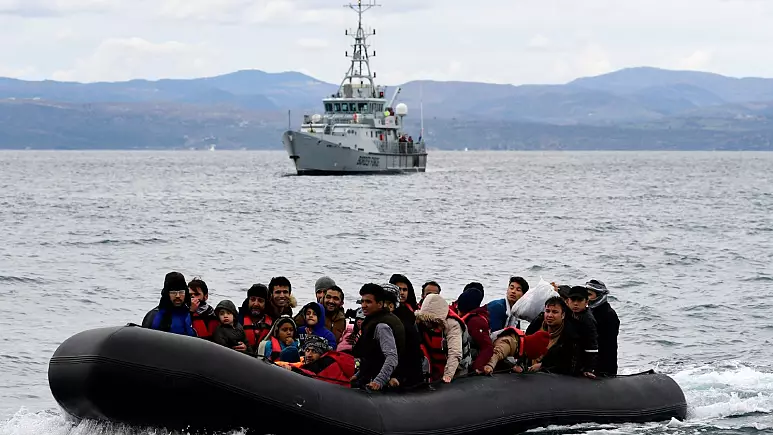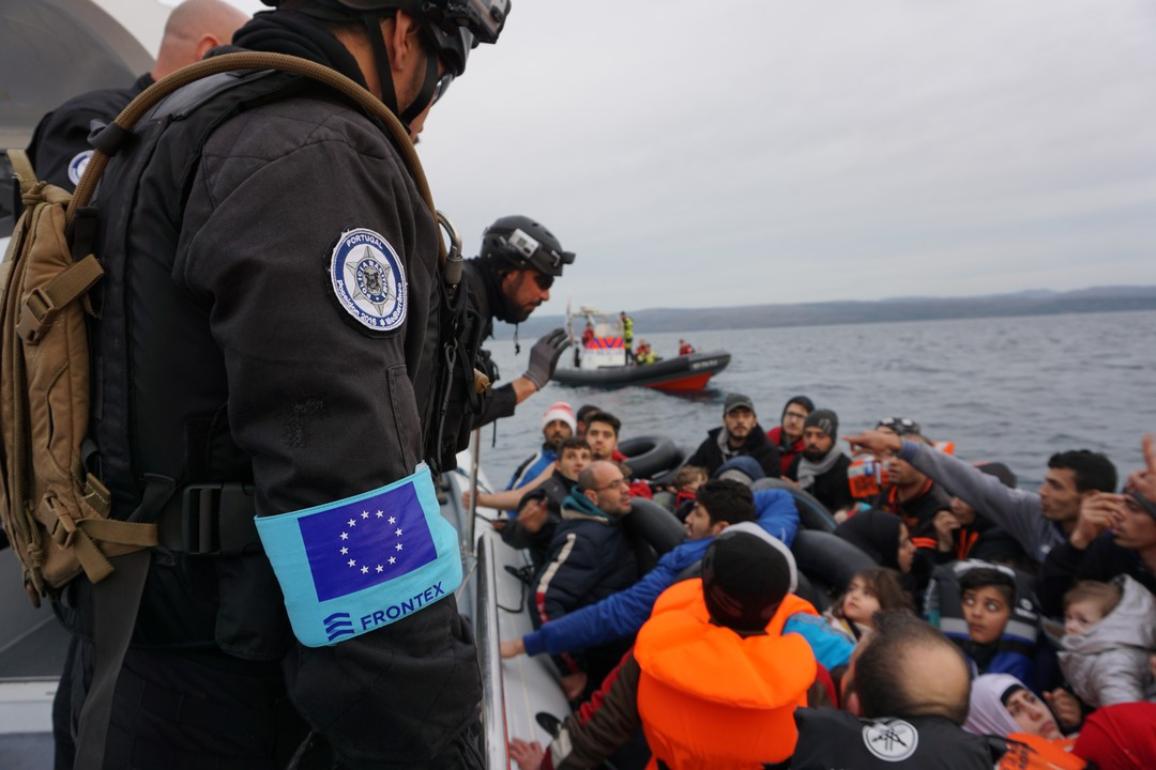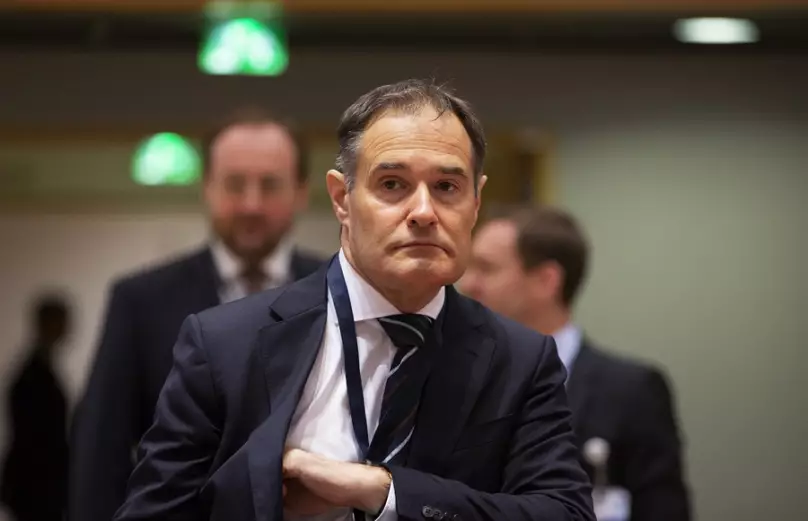This is How Frontex Covered Up Illegal Migrant Pushbacks by Greek Authorities

Thousands of migrants were victims of Greek illegal pushbacks and inhumane political games, trapping them "in neglected no-man's lands" or in fishing boats lost in the oceans.
An investigation conducted by the European Anti-fraud Office revealed that the European Border and Coast Guard Agency, Frontex, participated in financing the pushback of refugees at the Greek border.
According to the investigation, the agency was aware of violations against asylum seekers and their illegal and sometimes brutal deportation to Turkiye.
The investigation shows that at least six Greek boats, financed by Frontex, were involved in more than a dozen deportations between April and January 2020.
Frontex's Scandal
An investigation by the European Anti-fraud Office has exposed the involvement of the European border agency in covering up and helping to finance illegal pushbacks of asylum-seekers in Greece.
The report, which DER SPIEGEL has obtained, has put pressure on the EU Commission and Frontex's new leadership.
The files of the investigative report from OLAF, the European Union's anti-fraud agency, are categorized, and no one is allowed to have access to the content except for members of the European Parliament.
But Margaritis Schinas, the vice president of the European Commission responsible for migration, is allowed to see the content as it falls within his area of responsibility.

129 pages were taken to document Frontex's involvement in the illegal pushbacks of the Greek Coast Guard.
Guards on the border systematically "dump asylum-seekers adrift at sea in the Aegean – either in rickety boats or on inflatable life rafts," according to Spiegel International.
The investigators also reviewed private WhatsApp messages from the former head of Frontex, Fabrice Leggeri, and his team members interviewed witnesses and obtained recorded videos.
However, despite the revelations, Schinas has shown very little interest in the report; he even changed the subject when a member of the European Parliament asked him if he had read the report.
Damage Control
Frontex, established in 2004, is an independent and decentralized EU agency. Its basic tasks are relatively simple: helping member states coordinate the management of the EU's external borders.
In 2016 Frontex was renamed to become the European Border and Coast Guard, incorporating additional missions: fighting "serious crime with a cross-border dimension."
Frontex's precipitous rise soon caught the attention of observers, who warned about the impacts of the agency's "ever-expanding mandate," Euronews read.
The big scandal of the agency was in October 2020, when an investigative website Bellingcat accompanied by a group of media, issued an explosive report accusing Greek authorities of pushing back EU-bound migrants coming from Turkiye.

The report claimed that Frontex was completely aware of this illegal and sometimes brutal practice but failed to put an end to the collective expulsions.
Frontex staff was even helping the Greek officials in carrying out the pushbacks, which makes the agency a direct partner in the illicit behavior.
The investigation unleashed a political tempest in Brussels and across the continent following calls for the immediate resignation of Frontex's Executive Director, Fabrice Leggeri, who refuted such charges.

Frontex's brutal practices are again under the spotlight following an investigation conducted by OLAF, in which the former head of the European Union's external border surveillance agency said, "Frontex was aware of the illegal deportations of migrants by Greece and even co-financed some of the returns, according to a damning report published on Thursday by Der Spiegel," according to Euronews.
A leaked copy of the report was also consulted by Le Monde newspaper and the Lighthouse Reports investigative website.
"Instead of preventing these pushbacks, former boss Fabrice Leggeri and his staff covered them up. They lied to the European Parliament and hid the fact that the agency supported some pushbacks with European taxpayers' money," the German magazine summarized.
The new report showed many details, like how on 5 August 2020, the Greek coastguard "towed a dinghy with 30 migrants on board not to Greece but to Turkey. A Frontex plane on patrol filmed the scene."
Instead of stopping the Greek authorities' illegal practices, Frontex stopped patrolling planes over the Aegean Sea, saying it needed them elsewhere, and this was proof for turning a blind eye to these illegal acts.
Investigators found a note referring to the withdrawal of these planes "so as not to be a witness."

It is a Matter of Protection
German Foreign Minister Annalena Baerbock said during an official visit to Athens: "We now know, thanks to the report on Frontex and the publication today by the anti-corruption authority [OLAF], there have been several cases [of illegal pushbacks]."
She said during her visit to Frontex offices in Athens: "Even if I obviously cannot verify in detail what happened in each individual case…there have been pushbacks that are incompatible with European law."
She stressed that "measures have been taken immediately […] we have all talked about it today, to have more human rights observers on the spot."
According to the OLAF report, more than six Greek boats endorsed by Frontex were involved in more than a dozen illegal pushbacks between April and December 2020.
However, Greece always denies any illegal practices and pushbacks at its borders. Migration Minister Notis Mitarachi said on Thursday that he had only read "the summary" of the OLAF report, saying it "does not directly blame Greece."
"We have the right to protect our borders," he told the media.
Anitta Hipper, the European Commission spokeswoman, insisted that "a series of measures" had already been taken to address the agency's governance, headed by Latvian Aija Kalnaja since early July.
"In terms of work on the ground with the Greek authorities, there is progress on the ground," added Hipper, pointing also to "a new legislative proposal to ensure a robust monitoring system" for the treatment of asylum seekers in Greece.
Sources
- An investigation reveals the participation of the European Border Guard Agency in repelling asylum seekers [Arabic]
- Leaked report finds Frontex 'covered up' illegal migrant pushbacks by Greek authorities
- Classified Report Reveals Full Extent of Frontex Scandal
- Greece: Illegal pushbacks are dooming migrants to freeze to death [EN/AR]






